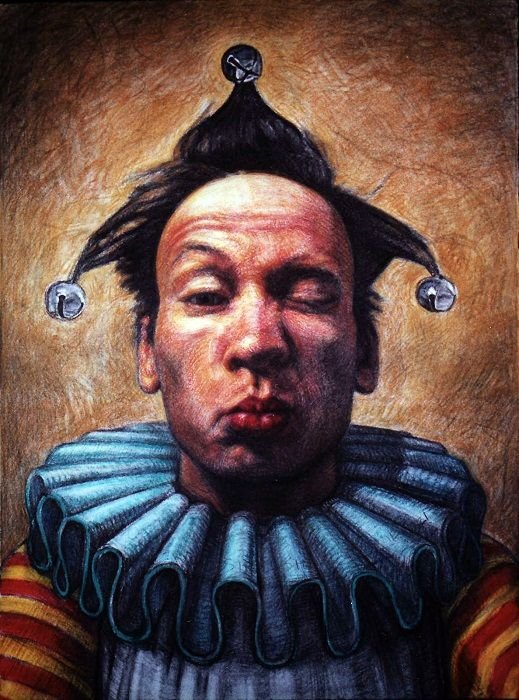Why do stupid people think they are smart?

Image source: Harmensz. van Rijn "The rich fool"
People, naturally devoid of humor, love to tell anecdotes. Drivers who barely manage to keep the car halfway out of the way die to teach others how to drive. Bosses who have no elementary, basic idea of the sphere in which they work, love to call a specialist on the rug and to bark him for something they do not even understand.
But why, why are all these people staggeringly incompetent and do not notice it?
All this happens under the so-called effect of Dunning-Krueger - two psychologists from the University of Cornell, who devote a special study of this phenomenon. People who are "struck" by this effect generally have low intelligence, a modest level of qualification, and a narrow view. Marked by this combination, they simply can not understand that the decisions they make are wrong, and the talent they think they own are improbable. That's why they believe faithfully in the rightness of all their actions and speak from the position of a higher instance.
Over the time, this worldview acquires the nature of psychological protection: the limited person begins to defend with his teeth and nails his view of the situation because only if he admits the thought that he may not be right begins to feel threatened by the more talented people.
At the same time, the talented ones are exactly the opposite: they very well understand how complex the laws of reality are, how immense the field of knowledge is in perspective to master - this wise tolerance ultimately leads to a lowering of self-esteem for their own abilities and underestimation of the place they deserve in society.
"I know that I don't know anything," repeated the wise Socrates, who had more than a modest life, and constantly subjected to the attacks of fools confident in his own ability. Is any of the limited people able to make such recognition ?!
The effect of ignorance dressed in self-esteem was theoretically predicted and then experimentally confirmed in 1999 by psychology specialists David Dunning and Justin Krueger. On the theoretical basis of their hypothesis they used the observations of great scholars and philosophers. Dunning himself quotes two of them: "Brigadier Freud More Brings Confidence than Knowledge" by Charles Darwin and "One of the unpleasant properties of our time is that those who are confident are stupid, and those who possess imagination and thought are filled with doubt and indecision, "- Bertrand Russell.

Image source Romatnic fool
A practical source of inspiration to experimentally investigate theory has become a cruel crime. The two scientists were provoked by the amazing robbery of the robber - McAlthur Wheeler, who robbed two banks one after the other by rubbing his face with lemon juice before, because he read somewhere that lemon juice was used as invisible ink and therefore the cameras would not "See" and write his face. Psychologists were deeply impressed by the deep incompetence of the criminal, who had not even tried to check in advance whether his idea of ??cover was true, although the opposite meant years of imprisonment.
This also led to the experiment, on the basis of which they formulated their theory of incompetence. They gathered in a hall representatives of different spheres of activity but with very different levels of real knowledge and asked them to fill out a questionnaire in which the participants had to mark their own level of competence in the sphere in which they work. The participants were then subjected to a number of tests that measured their true level of competence. Based on the results of the two tasks, a graph was drawn up demonstrating the dependence of real knowledge on self-confidence in the sphere of expression.
An imperfect but sufficiently eloquent parabola was obtained: on the left, where the most incompetent participants in the experiment were gathered, it reached an absolute apogee of 100% confidence in their own knowledge, abilities and skills. The curve then sharply decreases in the area where the overwhelming majority of people are well versed in their profession, but with a low self-esteem for their experience and skills. By the end, the curve rises again - where they are the best of the good, proven experts who know well that they understand and can more than the good professionals. But even their results reach only two-thirds of the peak of the full prophanas.

Image source - THE FOOL'S SHIP
As Dunning and Krueger have established, that profans not only overestimate their competence but are also unable to adequately assess professionals with an authentic high level of qualification in the same field. On top of all, they did not quite believe that they had made mistakes in their tests, measuring their real signs and abilities - most of them stubbornly supported their opinion even after being shown where they were wrong and their mistakes reasonably explained and motivated.
But, the hope that the blind can see, still remains. Dunning and Kruger suggested to the self-confident ignorant participants in their experiment to undergo a special training course where they not only acquired specific competencies in the professions they are pursuing, but also methods to measure their real competence over time. Most of them at least managed to understand that they lived in error. It's not just how Dunning and Kruger have succeeded in convincing them that they need training.